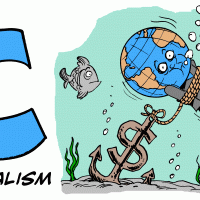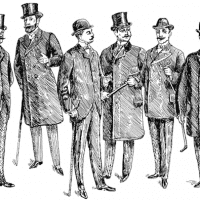-
Capitalism? Yes, let’s have a trial
In announcing his long-avoided royal commission into banking, Malcolm Turnbull said that “it will not put capitalism on trial”. What a shame!
-
Two billion dollars in stolen wages were recovered for workers in 2015 and 2016—and that’s just a drop in the bucket
The last four decades have been marked by rising wage inequality, with the vast majority of American workers experiencing wage stagnation while those at the top rung of the economic ladder reap the benefits of growth in productivity. These dynamics mean that many workers struggle to make ends meet; in 2016 one in five families in which at least one person worked were living below 200 percent of the federal poverty line (U.S. Census Bureau 2017).
-
Power to the People: In Italy, Potere al Popolo, a new left-wing movement is born
The meeting, attended by thousands of people, was thrilling and inspiring; all Italian communist parties and organisations, as well as environmentalist groups, social and community centres and workers associations took part in it.
-
Capitalism’s life source: the domestic and social basis for exploitation
Social reproduction theory (SRT) sounds quite intimidating, but the (rather grandiose) anthology of big words masks a relatively simple question: if capitalist production is fundamentally the production of commodities, and it is workers who produce such commodities, who ‘produces’ the worker?
-
The productive base as the ground of society and history: Marx’s base-superstructure theory
Base-Superstructure Theory (BST) is Marx’s guiding general theory, but is long misunderstood. Deeply embedded in a monumental corpus of system-challenging analysis, it has become lost in secondary interpretations with partial takes and opposed propagandas militating against coherent comprehension.
-
Alain Badiou debates reformist Laurent Joffrin
Alain Badiou is former chair of philosophy at École normale supérleure and author of In Praise of Politics. Laurent Joffrin is editor of Libération newspaper—and a reformist who defends existing social democracy. Alain Badiou recently announced that he would stop running his seminar. He also announced that he would soon be publishing The Immanence of Truths, completing […]
-
Concrete utopia
Where is Utopia today? Is this question relevant? One might argue that the term utopia is incongruous with the politics of our time, to say the least. Not only does the term ‘utopia’ indicate no place, when it found a place, it was mistreated and mutilated. What would be the place for utopian thinking in a world that is desperate to solve the accrued problems that it has created for itself? Would utopian thinking distract us from the real tribulations besetting the world?
-
Poll finds growing demand for reform in Russia
According to a survey by the Russian Academy of Sciences, 51% of Russians believe the country needs “significant reform” over “stability.” Though a small majority, that’s the first time “reform” has won out since before 2003, perhaps indicative of a changing political mood locally. Per the polling, the younger generation is the most pro-reform, with 62% in favor.
-
Debt comes for us all
“DON’T LET YOUR CHILDREN GO INTO CRIPPLING DEBT LIKE I HAVE!” I shout, as I and a group of students with SENS-UAW make our way to a major intersection just off Union Square. We wave signs, hoist our banner and merge into the crowd. We are protesting the new GOP tax bill, which will affect the lives of current, previous, and prospective students in critical and long-lasting ways.
-
Net neutrality and the socialist moment
In recent months, one of the United States’ most important debates has revolved around the broad concept of Net Neutrality (NN). Without delving into the technicalities, the concept of NN is that internet service providers (ISPs) cannot privilege or restrict internet data. Basically, once you’ve purchased your internet package with the requisite bandwidth parameters, your ISP cannot make your access to a certain site easier or harder, faster or slower.
-
Division, distraction, and domination: Revisiting the miner’s canary
A magazine owned by billionaire Michael Bloomberg recently reported on workers’ declining share of national income. “Why don’t workers get the full benefit of rising productivity? No one has good answers,” it stated, to the merriment of left Twitter. A raft of memes reminded Bloomberg Businessweek of the lessons of Piketty, Marx, and political economy generally.
-
Employers would pocket $5.8 billion of workers’ tips under Trump administration’s proposed ‘tip stealing’ rule
On December 5, the Trump administration took its first major step toward allowing employers to legally pocket the tips earned by the workers they employ. The Department of Labor (DOL) released a proposed rule that would allow restaurants to take the tips that servers earn and share them with untipped employees such as cooks and dishwashers.
-
Zachary Samalin reviews Karl Marx: Greatness and Illusion by Gareth Stedman Jones
“The Marx constructed in the twentieth century bore only an incidental resemblance to the Marx who lived in the nineteenth,” Gareth Stedman Jones writes at the close of his exhaustively researched biography Karl Marx: Greatness and Illusion (p. 595). This statement can be taken as the premise underlying Stedman Jones’s account of Karl Marx’s role in the political, economic and philosophical upheavals of the nineteenth century.
-
A revolutionary voice for women’s freedom available in English for the first time
Liz Payne reviews The Woman Worker by Nadezhda K Krupskaya.
-
The critique of value at Belshazzar’s feast
In the years since the 2008 economic crisis, renewed interest in Marx and Marxism has begotten interest in heterogeneous varieties that in one way or another violate the framework of the “traditional,” “official,” or “orthodox” Marxism that underpinned the workers’ movement in Europe and state socialism in the countries of the Eastern bloc.
-
Evgeny Pashukanis: Commodity-form theory of law
Whether one believes that law is provided by God (Natural Law), is created by human intellect (Positivism), a gendered institution perpetuating patriarchy (Feminism) or the maintainer of the status quo against marginalised groups (Critical Legal Studies), undergirding those beliefs is the assumption that law is autonomous.
-
The American savings crisis, explained
When you lay all that out, Americans’ terrible saving rate stops looking like such a mystery. In fact, it looks downright rational.
-
Limits on free speech
Judith Butler asks what happens when free speech clashes with other basic values.
-
The financial aristocrats will eat themselves
Even as far back as 1894, Karl Marx’s work saw that capitalism would devour its agents, writes DIEGO FUSARO.
-
Resilience is not enough
In “The Other Side of Resilience” Renata Silberblatt and Eamon Tewell (Progressive City, October 2017) raise some important questions about the focus on resilience as a way to respond to floods, droughts, wildfires, and climate change. But they don’t go far enough. It’s not just that resilience is more complex than it seems and has multiple meanings, as they point out.














![Monument to the Unknown Woman Worker [Cork Artist Louise Walsh]](https://mronline.org/wp-content/uploads/2017/12/17718587674_edb6e21c68_b-200x200.jpg)





